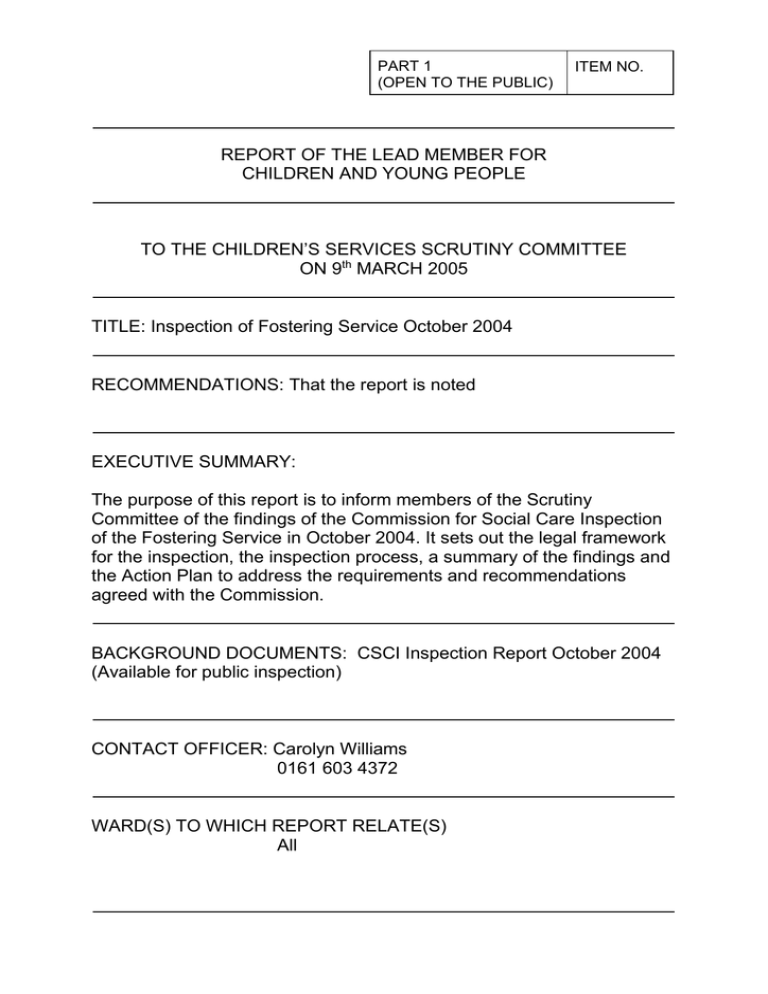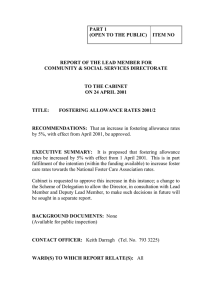REPORT OF THE LEAD MEMBER FOR CHILDREN AND YOUNG PEOPLE
advertisement

PART 1 (OPEN TO THE PUBLIC) ITEM NO. REPORT OF THE LEAD MEMBER FOR CHILDREN AND YOUNG PEOPLE TO THE CHILDREN’S SERVICES SCRUTINY COMMITTEE ON 9th MARCH 2005 TITLE: Inspection of Fostering Service October 2004 RECOMMENDATIONS: That the report is noted EXECUTIVE SUMMARY: The purpose of this report is to inform members of the Scrutiny Committee of the findings of the Commission for Social Care Inspection of the Fostering Service in October 2004. It sets out the legal framework for the inspection, the inspection process, a summary of the findings and the Action Plan to address the requirements and recommendations agreed with the Commission. BACKGROUND DOCUMENTS: CSCI Inspection Report October 2004 (Available for public inspection) CONTACT OFFICER: Carolyn Williams 0161 603 4372 WARD(S) TO WHICH REPORT RELATE(S) All KEY COUNCIL POLICIES: Foster care is the Council’s first choice for looked after children under 12. DETAILS Introduction The Care Standards Act 2000 established the National Care Standards Commission, an independent non-governmental body with the power to regulate social care services previously regulated by local councils. The act also provided for a new regulatory framework for Fostering Services and introduced a regime of annual inspections. The Fostering Services Regulations 2001 and National Minimum Standards for Fostering Services came into force in April 2002 and together form the basis of a new regulatory framework for the conduct of fostering services for all organisations providing fostering services under the Children Act 1989. In April 2004, The Commission for Social Care Inspection was created as a single, independent inspectorate for social care in England. It incorporates the work formerly done by the Social Services Inspectorate (SSI), the SSI/Audit Commission Joint Review Team and the National Care Standards Commission (NCSC). CSCI now regulates services relating to both adults and children through a process of registration and inspection. CSCI assesses all areas of the care services provided by the 150 local councils in England against a national agenda, ensuring they meet their social services responsibilities. Inspections of fostering services provided by both local authorities and independent agencies are carried out by CSCI on an annual basis. The purpose of the inspection is to establish whether the service is meeting the relevant legal and regulatory requirements. Failure to meet the regulations and standards can result in notification to the Secretary of State and enforcement action against the service provider. The outcome of inspections is taken into account in the authorities overall performance assessment. This is our third annual fostering service inspection. Previous inspections have taken place in February 2003 and February 2004. 2 Background information In September 2004 we had 206 approved foster carers. 263 children were placed with Salford foster carers on a full time basis with a further 74 children having regular short term breaks. 49 children were placed with foster carers approved and managed by independent or voluntary sector providers. Retention of foster carers is good with 67% of foster carers having fostered for Salford for 5 years or more. The service is large in comparison with other local authorities in the area other than Manchester. Inspection process Inspections are prearranged and take place over a number of days. The process involves: Submission of documentation including a pre - inspection questionnaire, managers’ self assessment document, and all policies, procedures and written materials relating to the service Random selection of a sample of foster carers’ and children’s case files for detailed analysis Questionnaires to foster carers, children in foster care and children’s social workers inviting them to comment on the service Visits to foster carers’ homes and interviews with foster carers, children and children’s social workers Interview with the registered service manager to determine suitability to manage the service Interviews with relevant staff both within the fostering service and throughout the Directorate on an individual and group basis Meetings with groups of foster carers including the Foster Care Association Meeting with a group of children in foster care Inspection of the services’ premises and facilities Inspection of information held on database and computer systems Observation of Fostering Panels and interviews with panel chairs Feedback from the Child Protection Unit After the inspection a draft report is written by the inspectors detailing how well the service meets the National Minimum Standards. A 4-point scale is used to indicate the extent to which standards have or have not been met. The service manager then has 28 days to comment and produce an Action Plan to address any requirements and 3 recommendations before the report is finalised and published on the CSCI website. Summary of findings Overall the inspectors found the service to be efficiently and effectively managed with all the standards met. The service was found to have exceeded the standards in 2 areas: The skills and experience of the manager The organisation and operation of the Fostering Panels Minor shortfalls were found in 2 areas: The suitability of the premises in which in the fostering service is based (Avon House) Documentation on children’s care files which was incomplete in some cases Foster carers and children commented positively on their experiences. Comparison with inspection reports on other local authority fostering services available on the CSCI website shows that Salford is performing well and had very few requirements and recommendations resulting from the inspection in comparison to other services. 4 SPECTION OF CITY OF SALFORD FOSTERING SERVICE IN October 2004 ACTION PLAN STATUTORY REQUIREMENTS Identified below are areas addressed in the main body of the report which indicate non-compliance with the Care Standards Act 2000, the Children Act 1989, the Fostering Services Regulations 2002, or the National Minimum Standards for Fostering services. The Authority or Registered Person(s) is/are required to comply within the given timescales in order to comply with the Regulatory Requirements for fostering services. STATUTORY REQUIREMENTS No. Regulation Standard Requirement 1 34 FS8 Children placed with foster carers must have a completed Care Plan Action being taken to address Statutory Requirements Directorate procedures state that all looked after children should have a Care Plan. Compliance will continue to be monitored through the Statutory and Quality reviews. Where files are found not to contain a completed Care Plan a specified time limit will be set for this to be completed and included on the child’s file. The situation referred to in the report, where the Care Plan had been absent through 3 internal audits, is being addressed. Completion date 31/1/05 2 23 FS26 The City of Salford must write to the Commission setting out the actions taken in respect of the Fire Service’s letter of 18th August 2004, following the discussions between the City of Salford and the Fire Service. The building has a valid Fire Safety Certificate. However, standards have changed and it is accepted that improvements are necessary. An updated Fire Risk Assessment is being carried out by Development Services. Some improvements to fire doors will be made in the near future. A bid will be made to the capital programme for other improvements to be considered as part of a planned programme of work in 2005/06, although no guarantee can be given that financial provision can be made during that year. A letter will be sent to the Commission with full details. 6 31/1/05 GOOD PRACTICE RECOMMENDATIONS Identified below are areas addressed in the main body of the report which relate to the National Minimum Standards and are seen as good practice issues which should be considered for implementation by the authority or Registered Person(s). GOOD PRACTICE RECOMMENDATIONS No. Standard 1 FS21 Recommendation Action Action being taken to address Recommendation The team should explore further with foster carers their view that they are less involved in planning future arrangements for the children placed with them so that any issues that are identified can be discussed with the teams who are responsible for supervising children in placement. This will be discussed further with foster carer representatives and in the Foster Care Forum so that any issues can be taken up with Children and Families Social Work Teams. However, it is important to note that this is a limited view and may not represent the view of the majority of carers. There are other positive comments in the report that appear contradictory, for example reference to one foster carer feeling part of a “network of professionals”. 7



